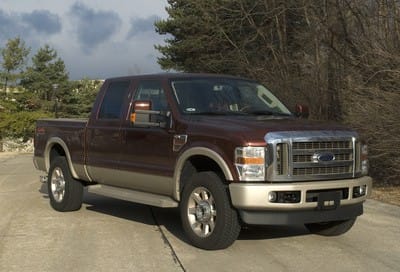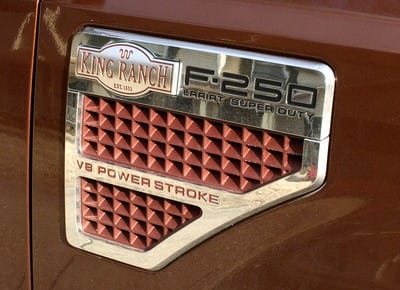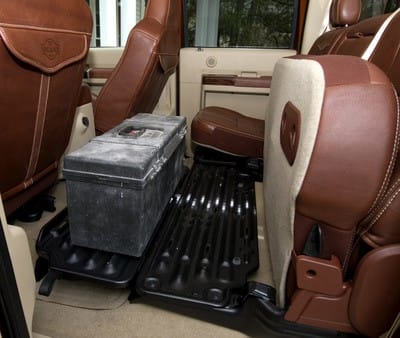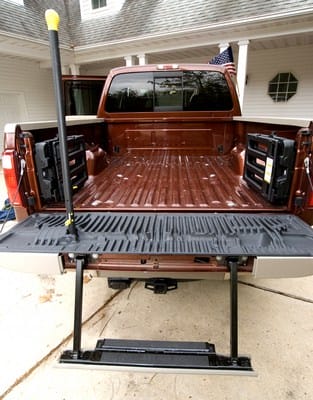
Built in the U.S. at Ford’s Kentucky plant, you now have a civilized choice in big diesel performance with far better than just average comfort.
If you purchased a Super Duty back in early 2000’s you most likely found it a very stout truck that did a great job of filling a void that heavy haulers need for extra capacity and serious pulling. The older Super Duty limitations included lower fuel economy, limited acceleration and a much stiffer ride.

The first 250’s were all about an impressive frame and gearing. This second generation Super Duty is all about refining a beast, while slipping in a smoother, beefier power upgrade, with a highly sophisticated interior.
Before I get into all that torque, horsepower and towing capacities there is one aspect you should understand about this truck. This new truck has outstanding comfort, enough that you can drive it without 500 pounds in the back. That’s no small accomplishment for a truck that can carry over 2,800 pounds in the bed, and tow as much as 12,500 pounds off the hitch.
The new 250 sports Ford’s V8 diesel engine cranks out a brawny 350 horses at 3,000 rpm with a blistering 650 lb-ft of torque. It has staggeringly quick and smooth acceleration, without turbo lag.
If you haven’t been in a Ford for a while, there have been some big changes. First, their diesels are now down right fast and quiet. On the highway I was doing 80 uphill without the slightest hesitation, and got up to high speed so quickly you’re just asking for a ticket. As far as the improved sound levels, I was able to order a taco from a clown without shutting off the engine. Another new diesel convenience is a very snappy glow plug. Except for starting the truck when it’s cold, you barely have to pay attention to the plug once the truck is warm, it only takes a moment.

The fuel economy is also greatly improved. I was able to drive in city conditions and get over 16 miles to the gallon. In highway travel the truck delivers an easy 18 miles to the gallon, and after 20,000 miles there’s a good chance that it will raise to 20 MPG. The interior is a King Ranch supple-stressed brown leather, that will make you think twice about drinking a cup of coffee without a lid. The power extending mirrors are more than a convenience; it’s amazing how well you can see around a trailer.
One of my favorite additions to the 08 Super Duty line is the easy tailgate operation and step. When you lower the tailgate you can lift the vertical grab bar, and release a step that pulls out of the top of the gate, making loading and stepping into the truck a breeze. There’s not much I don’t like about the King Ranch Super Duty. However, I would like to see a more abrasive finish on the back seat steel floor plate that’s used to keep your tool boxes off the sweet leather.
The price for the 250 SD starts around $38,000 with 4×4. Include the 6.4 liter V8 Diesel and Toroshift 5-speed-auto transmission, and you’ll hover near an $8,300 addition. Add King Ranch leather, larger wheels, navigation, and few other accessories and you’re looking at a price tag at well over $50,000. But if you play in heavy load land, that’s a bargain.
Do you need a diesel?
So before you lay out nearly $50,000 for a truck, you need to ask yourself, “Do I really need a diesel?”

Pulling
If there’s one thing that a diesel does perfectly, it’s pulling. Mammoth amounts of torque are your friend when your choice of cargo is a load of lumber, horses, a big boat or a travel trailer that’s big enough for a family to live in. You need torque to comfortably pull these loads and you will find your fuel economy will hover at around 10 or 11 miles per gallon, depending on the load. That’s huge compared to big-block gas engines that can drop down to as low as 6 or 7 miles to the gallon in similar driving conditions.
Keep in mind that a new half-ton Ford F150 4×4 with a 5.4 liter engine gets around 17 miles to the gallon on the highway. It can tow more than 8,000 pounds and will, with regular maintenance, easily last over 150,000 miles.
Now honestly answer the following questions: “Do you tow every week? Are you regularly hauling loads in the 60-percentile of your current truck capacity? Do you drive more than 30,000 miles a year? Are you going to keep a truck more than four years?”
Although a large-scale home renovation may put some strain on your half-ton during its two trips per year spent hauling loads of sheet rock, it may not justify buying a diesel. But if you throw a horse or travel trailer into your future, a diesel engine is a good investment.
Before you buy?
Talk to a local independent diesel mechanic before you buy any new diesel truck. They will give you an honest picture of maintenance frequency, costs and mileage expectations.



